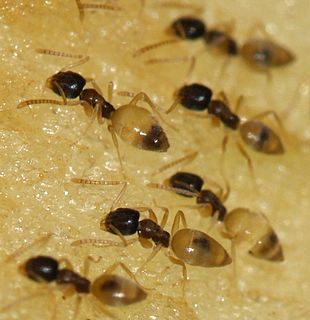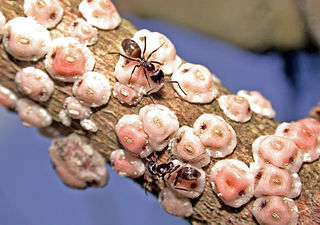
Dolichoderinae is a subfamily of ants, which includes species such as the Argentine ant, the erratic ant, the odorous house ant, and the cone ant. The subfamily presents a great diversity of species throughout the world, distributed in different biogeographic regions, from the Palearctic, Nearctic, Afrotropical region and Malaysia, to the Middle East, Australian, and Neotropical regions.

Tapinoma is a genus of ants that belongs to the subfamily Dolichoderinae. The genus currently comprises 74 described species distributed worldwide in tropical and temperate regions. Members of are generalized foragers, nesting in a wide variety of habitats, ranging from grasslands, open fields, woodlands, to inside buildings. The majority of species nest in the ground under objects such as stones or tree logs, other species build nests under bark of logs and stumps, in plant cavities, insect galls or refuse piles.

Leptomyrmecini is a tribe of Dolichoderinae ants with 16 genera and two extinct genera.
Dorymyrmex alboniger is a species of ant in the genus Dorymyrmex. Described by Forel in 1914, the species is endemic to Argentina.
Dorymyrmex antarcticus is a species of ant in the genus Dorymyrmex. Described by Forel in 1904, the species is endemic to Argentina and Chile.

Dorymyrmex biconis is a species of ant in the genus Dorymyrmex. Described by Forel in 1912, the species is endemic to Colombia and Venezuela.
Dorymyrmex breviscapis is a species of ant in the genus Dorymyrmex. Described by Forel in 1912, the species is endemic to Argentina.
Dorymyrmex bruchi is a species of ant in the genus Dorymyrmex. Described by Forel in 1912, the species is endemic to Argentina.

Dorymyrmex brunneus is a species of ant in the genus Dorymyrmex. Described by Forel in 1908, the species is endemic to several nations in South America.
Dorymyrmex carettei is a species of ant in the genus Dorymyrmex. Described by Forel in 1913, the species is endemic to Argentina.
Dorymyrmex caretteoides is a species of ant in the genus Dorymyrmex. Described by Forel in 1914, the species is endemic to Argentina.
Dorymyrmex chilensis is a species of ant in the genus Dorymyrmex. Described by Forel in 1911, the species is endemic to Chile.
Dorymyrmex ebeninus is a species of ant in the genus Dorymyrmex. Described by Forel in 1914, the species is endemic to Argentina.
Dorymyrmex ensifer is a species of ant in the genus Dorymyrmex. Described by Forel in 1912, the species is endemic to Argentina.

Dorymyrmex exsanguis is a species of ant in the genus Dorymyrmex. Described by Forel in 1912, the species is endemic to Argentina and Paraguay.

Dorymyrmex grandulus is a species of ant in the genus Dorymyrmex. Described by Forel in 1922, the species is endemic to the United States.

Dorymyrmex jheringi is a species of ant in the genus Dorymyrmex. Described by Forel in 1912, the species is endemic to Brazil and Paraguay.
Dorymyrmex richteri is a species of ant in the genus Dorymyrmex. Described by Forel in 1911, the species is endemic to Argentina.
Dorymyrmex wolffhuegeli is a species of ant in the genus Dorymyrmex. Described by Forel in 1911, the species is endemic to Argentina.









